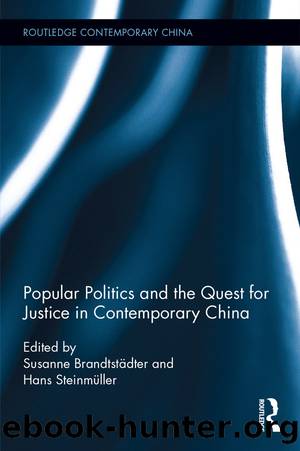Popular Politics and the Quest for Justice in Contemporary China by Susanne Brandtstadter & Hans Steinmuller

Author:Susanne Brandtstadter & Hans Steinmuller [Brandtstadter, Susanne & Steinmuller, Hans]
Language: eng
Format: epub
ISBN: 9781138228597
Google: bpI-vgAACAAJ
Goodreads: 32832355
Publisher: Routledge
Published: 2017-01-15T12:40:35+00:00
Local citizenship in the era of routinized reform
Local citizenship has changed greatly, even while retaining its centrality to the social organization and political economy of contemporary China. We emphasize only three of the many relevant issues here: land grabbing by local governments, preferences to retain rural hukous in some areas, and the recent hukou reform initiatives launched by the central government.
The conversion of agricultural land to other uses is one of the most important processes of wealth creation in reform China. Changes in how this wealth is created has fundamentally challenged the operation of local citizenship in rural areas, since it has been the economic basis for the dividends and other benefits distributed to locals that we discussed in the previous section. Most observers of the situation agree with the conclusion that farm households ârarely receive adequate compensationâ and have âbeen unable to exercise their rights as owners of collective landâ; with âno institutional safeguards to guarantee equal voice for individual farmers, a handful of local officials gain at the expense of individualsâ (Zhou 2009: 125). We suggest that outright predatoriness was less blatant and extreme in the first reform decade than after 1992 because of the constraints that had earlier been created by uncertain property rights and rules for economic enterprise.
Yan Sun concluded that prior to 1992, bribery and associated activities âdid not result in overwhelming harms that strangled reformâ (Sun 2004: 80). Rampant bribery did produce unfairness in access to resources and contributed to income inequality, but also contributed to the flow of goods and information, and played an overall constructive role in a system (Sun 2004). After 1992, however, bribery could no longer be seen as circumventing âbarriers to equal access. Rather, it undermines a dominant market and thus the reform program itself, making unequal ⦠competition the rule of the gameâ (Sun 2004: 86). Illegal and corrupt practices had often been seen differently if done for the collective advantage of a locality rather than solely for an officialâs benefit (Smart 1993).
More radical reforms after 1992 were accompanied by a reversal of the previous trend of decentralization. The central stateâs share of total budgetary revenue had dropped from 40 percent in 1983 to just over 20 percent in 1993. As a result of a new tax assignment system, the centreâs take soared to almost 60 percent in 1994; although a substantial portion of this was reallocated to the provinces, the new system still gave Beijing much more effective power (Yang 2004: 74).
Fiscal decentralization in the 1980s may have facilitated corruption, but Kang Chen (2004) has argued that recentralization in the 1990s did not end it. Instead, it channelled it into a more destructive form. The previous tax system provided incentives for local officials to promote local development, since they would share in the proceeds. This produced what Chen (2004: 1002) describes as âhelping handâ corruption, such as âcollective briberyâ done in the interests of the locality. Recentralization undermined these incentives, encouraging âshort time-horizon, grabbing-hand behaviour that was
Download
This site does not store any files on its server. We only index and link to content provided by other sites. Please contact the content providers to delete copyright contents if any and email us, we'll remove relevant links or contents immediately.
Spell It Out by David Crystal(35861)
Life for Me Ain't Been No Crystal Stair by Susan Sheehan(35550)
Cecilia; Or, Memoirs of an Heiress — Volume 1 by Fanny Burney(32093)
Cecilia; Or, Memoirs of an Heiress — Volume 3 by Fanny Burney(31481)
Cecilia; Or, Memoirs of an Heiress — Volume 2 by Fanny Burney(31435)
The Great Music City by Andrea Baker(30931)
Professional Troublemaker by Luvvie Ajayi Jones(29445)
We're Going to Need More Wine by Gabrielle Union(18664)
Twilight of the Idols With the Antichrist and Ecce Homo by Friedrich Nietzsche(18324)
The Secret History by Donna Tartt(18267)
All the Missing Girls by Megan Miranda(14857)
Cat's cradle by Kurt Vonnegut(14804)
Pimp by Iceberg Slim(13828)
Bombshells: Glamour Girls of a Lifetime by Sullivan Steve(13718)
Fifty Shades Freed by E L James(12937)
Talking to Strangers by Malcolm Gladwell(12916)
Norse Mythology by Gaiman Neil(12880)
The Social Justice Warrior Handbook by Lisa De Pasquale(11969)
Underground: A Human History of the Worlds Beneath Our Feet by Will Hunt(11857)
